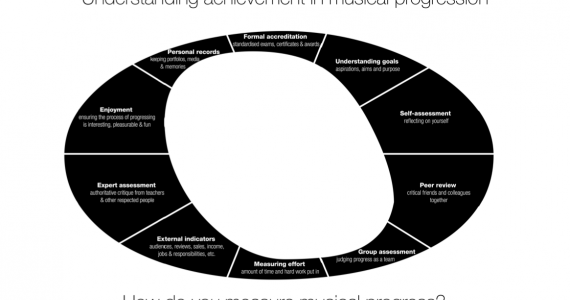Understanding achievement in musical progression

How do you measure musical progress? A poster depicting the main ways in which musical learners and the people that support them measure and monitor musical progress.
If you ask people how they think they measure musical progression, you may well get quite a complicated answer. Perhaps the most recognised measures are things like graded music exams, GCSE results etc. But interestingly, virtually none of the 40 young musicians and music education professionals mentioned exams when we asked them to consider how they understood musical achievement, at a recent meeting of the Musical Progressions Roundtable.
Measuring, monitoring and assessing are a crucial element of progression: we do them all the time - constantly measuring how we, or the people we're supporting, are doing. What needs working on? What's wrong? What's right? What's exceptional? Is this heading in the right direction? Do I like it? Do they like it? How do I know it's any good etc. So inevitably, the measures we use have a huge impact on the support for progression we end up giving.
All measures are good at measuring some things, but not others. You wouldn't use a ruler to measure creativity. I designed this poster, distilling the responses from this Roundtable meeting and other sources and discussions, to help people with thinking about which measures they use, and which they don't, and with what consequences.
I've written more about measurements here and also in this post on journeys, learning and being exceptional.
I host the Roundtable with Awards for Young Musicians, with funding from Youth Music.








Add comment